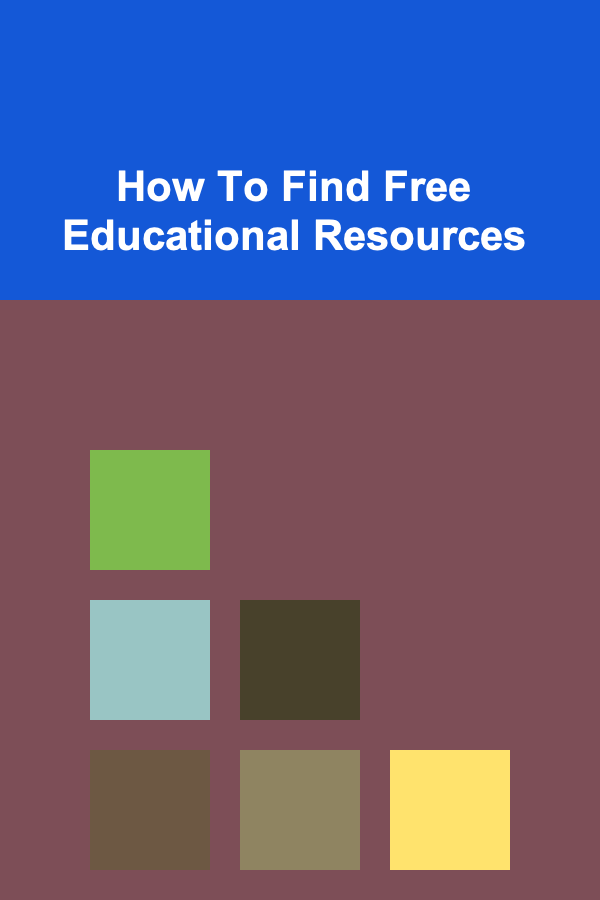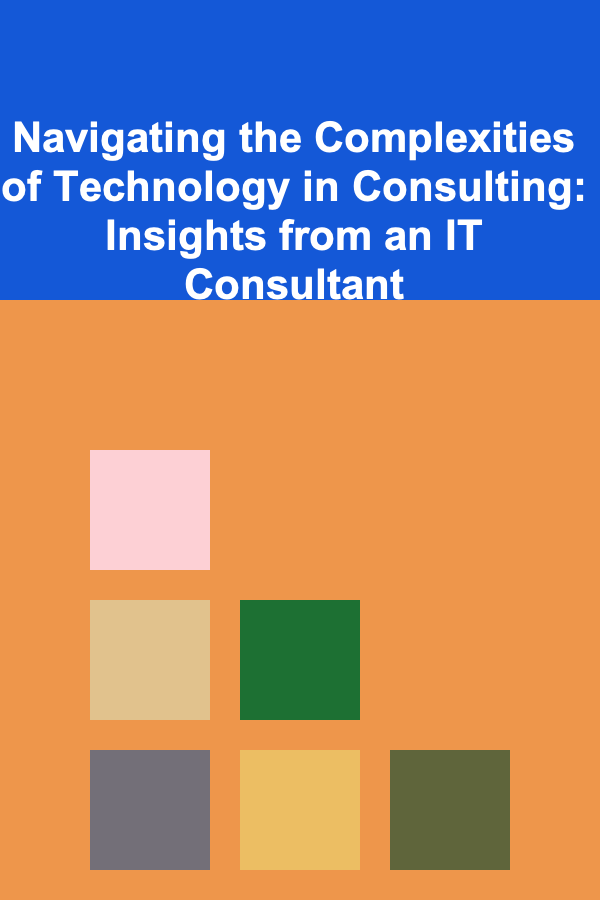
How To Find Free Educational Resources
ebook include PDF & Audio bundle (Micro Guide)
$12.99$7.99
Limited Time Offer! Order within the next:

In today's fast-paced world, learning and personal growth are essential for everyone. Fortunately, the internet has made education more accessible than ever before. With countless resources available online, it is now easier to learn new skills, gain knowledge, and expand one's horizons. However, while some educational content comes with a hefty price tag, there are also a plethora of free resources available for anyone who wants to take advantage of them.
Finding high-quality educational resources without spending money may seem daunting, but with the right strategies, anyone can tap into these opportunities. Whether you are a student looking for free materials to complement your coursework, a professional hoping to improve your skills, or simply someone with a curious mind, there are various ways to find free educational resources. This article explores some of the most effective methods to find free educational content and discusses a variety of resources available for all types of learners.
Why Seek Free Educational Resources?
Before diving into the various methods of finding free educational resources, it is worth understanding why you might want to seek them out in the first place. Here are a few reasons why free educational resources are so valuable:
- Accessibility: Education should not be limited to those who can afford expensive courses or textbooks. Free resources make learning available to anyone with an internet connection, ensuring that financial constraints do not prevent access to knowledge.
- Flexibility: Many free educational resources allow learners to study at their own pace. This flexibility is crucial for those who may have other commitments, such as jobs or family, and need to fit learning into their busy lives.
- Diverse Learning Options: With a wealth of free content available, learners can access a wide range of subjects and formats. Whether you prefer reading, watching videos, listening to podcasts, or engaging in interactive learning, there is a free resource out there for you.
- Supplementary Learning: Free resources can supplement formal education, whether it is K-12 schooling, college, or professional development. They can help reinforce concepts, provide additional practice, or offer different perspectives.
- Continuous Growth: Lifelong learning is vital for personal development and career growth. Free educational resources empower individuals to continue learning well beyond the classroom.
Now that we understand the importance of free educational resources, let's explore how to find them effectively.
Use Online Course Platforms
Online learning platforms offer a wide range of free courses, sometimes even from top universities and experts in their fields. These platforms often provide a structured curriculum and some offer certificates upon completion. Here are a few platforms to explore:
Coursera
Coursera offers free courses from universities such as Stanford, Yale, and Princeton. While many of their programs require payment for certification, you can audit the course for free, giving you access to the content without the cost.
edX
Similar to Coursera, edX offers courses from top universities, including Harvard, MIT, and Berkeley. You can access most courses for free, although a fee is required for certificates or graded assignments.
Udemy
Udemy has a wide variety of free and paid courses on various topics. While many of their courses come at a cost, there are numerous free courses available. You can search for free courses based on your interests or needs.
FutureLearn
FutureLearn provides free courses from leading universities and cultural institutions worldwide. Although some features may require payment, many of the courses can be taken for free, with a chance to purchase a certificate of completion if desired.
Khan Academy
Khan Academy offers a wealth of free resources aimed at K-12 education but also includes materials for higher learning and test preparation. With engaging video lessons and practice exercises, Khan Academy is a valuable tool for learners of all ages.
Explore Open Educational Resources (OER)
Open Educational Resources (OER) are freely accessible, openly licensed materials that are used for teaching, learning, and research. These materials include textbooks, lecture notes, video lessons, and more. Since they are open, educators and learners can modify and distribute these resources.
OER Commons
OER Commons is a digital library of open educational resources that can be searched by grade level, subject, and type of resource. Whether you're looking for lesson plans, textbooks, or multimedia, OER Commons offers a wide range of free materials.
OpenStax
OpenStax is a nonprofit organization that offers free, peer-reviewed, openly licensed college textbooks. These textbooks cover a variety of subjects and are available for download or online reading.
MERLOT
The Multimedia Educational Resource for Learning and Online Teaching (MERLOT) offers free access to a large collection of learning materials, including simulations, tutorials, and e-books. You can find resources for all levels of education, from K-12 to higher education.
Leverage YouTube for Free Educational Content
YouTube is not only for entertainment but also a goldmine of free educational videos. Many experts, educators, and organizations upload valuable content to the platform, offering everything from short tutorials to full-length courses.
Search for Educational Channels
There are numerous YouTube channels dedicated to providing free educational content on a variety of topics. A few popular ones include:
- CrashCourse: A well-known channel offering in-depth video courses on subjects like history, literature, and science.
- Khan Academy: In addition to their website, Khan Academy has a YouTube channel featuring videos on various subjects, especially mathematics and science.
- TED-Ed: TED-Ed creates animated educational videos on a range of topics, often featuring experts in their respective fields.
Playlists and Documentaries
You can also find entire playlists or documentaries on YouTube that can deepen your knowledge in specific areas. Many documentaries and educational content are freely available, providing insight into everything from historical events to scientific discoveries.
Utilize Public Domain and Creative Commons Resources
Public domain and Creative Commons (CC) licensed content is free to use, often with very few restrictions. These types of resources allow you to legally download, use, and share educational materials.
Project Gutenberg
Project Gutenberg offers over 60,000 free eBooks, many of which are in the public domain. The collection includes a vast array of classic literature, historical texts, and more.
Internet Archive
The Internet Archive is a nonprofit digital library that offers free access to millions of books, movies, music, and websites. You can explore materials from a wide range of subjects, including academic papers, educational films, and historical resources.
Creative Commons Search
The Creative Commons Search tool allows you to find educational resources that are licensed under Creative Commons. These resources can include images, videos, audio files, and even academic articles. You can freely use, share, and modify them as long as you comply with the terms of the license.
Join Online Learning Communities
Learning communities are groups of individuals who come together to share knowledge and resources. Many online communities provide access to free educational content, discussions, and peer support.
Reddit is home to many educational subreddits where people share free learning resources, ask questions, and offer advice. Popular subreddits include:
- r/learnprogramming: A place to learn coding and programming for free.
- r/learnmath: A community for those looking to improve their mathematics skills.
- r/LanguageLearning: A space for language learners to find free resources and tips.
Facebook Groups
Facebook has numerous groups dedicated to specific learning topics, such as coding, language learning, and academic research. Many of these groups share free resources, tips, and peer support.
LinkedIn Groups
LinkedIn groups also offer valuable networking opportunities and discussions around free educational resources. Joining groups related to your area of interest can help you discover free materials and stay up-to-date with the latest learning trends.
Free Educational Podcasts and Audiobooks
Podcasts and audiobooks are excellent ways to consume educational content on the go. Many podcasts offer free insights into a variety of subjects, while audiobooks provide access to written works that can be listened to anytime, anywhere.
Educational Podcasts
Podcasts are an ideal resource for learning during commutes or while performing other tasks. Some popular educational podcasts include:
- The EdSurge Podcast: Offers discussions on technology and innovation in education.
- The Tim Ferriss Show: Tim Ferriss interviews successful people from various fields, sharing valuable life and business lessons.
- Stuff You Should Know: A podcast that provides entertaining and informative content on a wide range of topics.
Free Audiobooks
Many platforms offer free audiobooks, such as:
- LibriVox: A collection of public domain audiobooks, read by volunteers.
- Open Culture: Offers free downloadable audiobooks on a variety of subjects, including literature, history, and philosophy.
Explore Local Libraries and Institutions
Many public libraries and educational institutions offer free access to educational resources. Even if you're not physically present at the library, many of them offer online services.
Public Libraries
Public libraries often provide free access to books, eBooks, audiobooks, and online courses. Check with your local library to see what digital services they offer. Many libraries have partnerships with services like OverDrive and Hoopla that provide access to eBooks and audiobooks for free.
University Resources
Many universities offer free access to certain educational materials through their websites. Some universities publish lecture notes, research papers, and other educational resources for public access.
Conclusion
The internet has revolutionized the way we learn, making education more accessible to people all over the world. Free educational resources are abundant, and with the right approach, anyone can take advantage of them to further their knowledge and personal growth. Whether you are looking for structured courses, informal learning, or supplementary materials, there are countless free options available. By exploring online platforms, OER, YouTube, public domain materials, and learning communities, you can access the tools needed for lifelong learning---without spending a dime.

How to Keep Your Home Clean When You Have Small Children
Read More
How to Layer Lighting in Your Bedroom for Maximum Comfort
Read More
How to Set Up a Creative DIY Craft Station for Your Home Party
Read More
How to Use Acoustic Panels for Better Soundproofing
Read More
How to Use Storage Ottomans for Dual-Purpose Spaces
Read More
Navigating the Complexities of Technology in Consulting: Insights from an IT Consultant
Read MoreOther Products

How to Keep Your Home Clean When You Have Small Children
Read More
How to Layer Lighting in Your Bedroom for Maximum Comfort
Read More
How to Set Up a Creative DIY Craft Station for Your Home Party
Read More
How to Use Acoustic Panels for Better Soundproofing
Read More
How to Use Storage Ottomans for Dual-Purpose Spaces
Read More